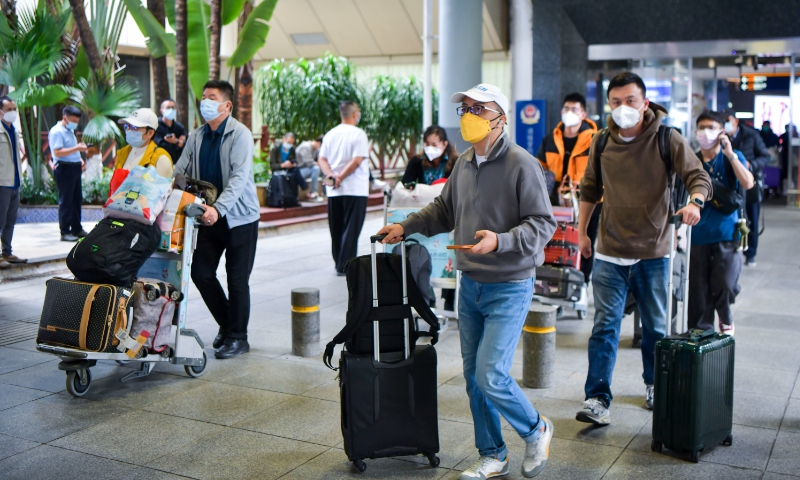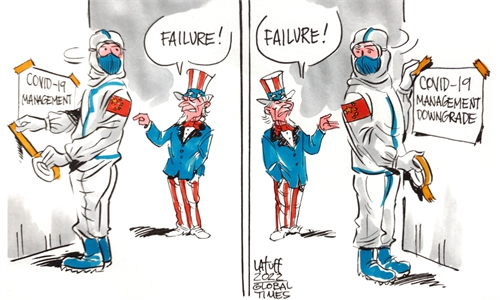
Passengers walk out of Haikou Meilan International Airport on December 9, 2022. Photo: VCG
Most countries around the world have welcomed China's move to open up to travelers from all over the globe and encouraged Chinese to travel abroad, after the country's COVID-19 battle entered a new stage. However, a small number of countries and regions, such as the US and Japan, see China's reopening as another chance to defame Beijing. Some imposed travel restrictions on arrivals from China, citing what experts called "unnecessary " and "discriminatory" measures to defend their moves, some media reports discredited China’s COVID policy, but the real intention is to sabotage China's three years of COVID-19 control efforts and attack the country's system.
Virologists in charge of monitoring coronavirus variants in China told the Global Times that China has never stopped monitoring prevailing variants in this country, and would never let new variants go unreported. China's caseload, despite ballooning in the recent exit wave, is still a small number compared with the global tally, which means it is more likely China faces the risk of new variants imported from other countries, than the other way around.
The US Centers for Disease Control and Prevention said on Wednesday that from January 5, travelers boarding flights to the US from the Chinese mainland, Hong Kong and Macao would need a negative COVID-19 test or proof they had recovered from a previous infection. The requirements also apply to passengers arriving in the US via a third country and to those connecting to other destinations through the US.
The US authority claimed the measures are intended to "slow the spread" of the virus in the US following the surge in China and are being implemented because of "the lack of adequate and transparent epidemiological and viral genomic sequence data being reported from" Beijing, and that "reduced testing and case reporting in the PRC and minimal sharing of viral genomic sequence data could delay the identification of new variants of concern if they arise."
The US move came after Japanese Prime Minister Fumio Kishida said earlier this week that Japan will require COVID-19 tests on arrival for travelers from the Chinese mainland from Friday (December 30), and his government would also reduce a planned increase in flights between Japan and China "just to be safe.'' Those who test positive will be quarantined for seven days at designated facilities.
A similar move was also adopted by the island of Taiwan, whose local authority said on Wednesday that the island will test arrivals from the Chinese mainland for COVID-19 from January 1.
Japan and the island of Taiwan cite similar excuses used by the US authorities.
Those countries and regions' reaction came after the Chinese central authorities announced this week that centralized quarantine for international arrivals would end on January 8 and international travel for Chinese citizens would be resumed.
In response to restrictive measures on arrivals from China, Wang Wenbin, spokesperson of the Chinese Ministry of Foreign Affairs, said that China believes countries' response to COVID-19 should be science-based and proportionate and apply equally to people of all countries without affecting normal travel and people-to-people exchange and cooperation.
He hopes that all countries adhere to a science-based response approach and work together to ensure safe cross-border travel, keep global industrial and supply chains stable, and contribute to global solidarity against COVID and the world economic recovery.
In a rebuke to those countries' smears, an expert who was in charge of monitoring coronavirus variants in China told the Global Times on Thursday that although China had stopped publishing daily tallies of COVID-19 cases, scientists never suspended monitoring of prevailing variants circulating in the country.
Hospitals of all levels in China take samples from mild COVID-19 cases and severe cases, then hand them to the Chinese Center for Disease Control and Prevention (China CDC), said the expert, who requested anonymity. "In recent weeks, we have monitored thousands of samples, but we did not detect an original strain, or Delta variant, nor any new variant, as they [US, Japan and some other countries] claimed."
China, just like other parts of the world, has suffered the impact of COVID-19, "thus, if we detected a new variant, there's no reason we would hide any alarming signs from the public," said the expert.
In response to whether China has been playing down the number of deaths caused by COVID, Liang Wannian, head of the expert panel overseeing the national COVID-19 response, said on Thursday that it is hard to get an accurate grasp of the death rate when the infection spreads fast. Such a judgment can only be made after the infection ebbs away, media reported.
The current stage should focus on preventing severe and fatal cases, Liang said.
Italy also said on Wednesday it is imposing mandatory Covid-19 tests for travelers arriving from China. Yet its government said on Thursday that Italy did not find any new concerning COVID-19 mutations in the recent arrivals from China who had tested positive for the virus.

Customers have meal at a restaurant of a business center in Beijing, Dec 25, 2022. Photo:Xinhua
The expert explained that it is possible that a surge in infections could lead to the emergence of new variants. However, China's recent case increase is just a drop in the ocean compared with the global caseload, and it is more likely that China faces new variants from abroad than the other way around. So measures, targeting only arrivals from China, are discriminatory, said the expert.
The US alone has recorded more than 100 million formally diagnosed and reported COVID-19 cases by last week, CNBC reported on Wednesday, and warned that the number of Americans who have actually had the virus since the beginning of the pandemic is probably more than twice that number.
Xu Wenbo, head of the National Institute for Viral Disease Control and Prevention with the China CDC, also said that in the last three months, China has detected 130 sub-variants of Omicron, such as BF.7, BQ.1 and XBB entering the country, media reported on Thursday.
However, most countries are welcoming China's reopening to the world, as embassies and tourism authorities of many countries welcomed Chinese tourists, saying they have been waiting for them for three years.
A German health ministry spokesperson said on Wednesday, "We are monitoring the situation in China very closely, but at the moment we have no indication that a more dangerous mutation has developed... which would justify the declaration of a virus variant zone."
Political trick
Experts said that it is understandable for countries to be cautious in the face of COVID-19, but specifically targeting China and jumping on its reopening to smear the country's COVID-19 battle and its system is clearly a dirty political trick by those countries.
Those countries' moves are back-pedaling on history, said Li Haidong, a professor at the Institute of International Relations at the China Foreign Affairs University. He said that the policy of screening Chinese travelers is beyond comprehension, as those countries have already suffered waves of mass infections.
On top of adopting restrictive measures on arrivals from China, the US' propaganda machine is also running like crazy to smear China, which actually revealed that Washington still cannot adopt a scientific attitude toward controlling the virus. This is why they bungled their COVID-19 control efforts earlier on, Lü Xiang, an expert on US studies and a research fellow at the Chinese Academy of Social Sciences, told the Global Times.
When the US points its fingers at China for stopping its daily reports on COVID-19 cases and ending mass testing, it seems to have forgotten that the US dropped its daily reporting of COVID-19 cases in October, and that its failed attempt to curb more deadly variants from circulating has resulted in more than 1 million deaths in the country, more than anywhere in the world.
In response to foreign media accusations that China's adjustment of its COVID-19 policy means that the country no longer prioritizes people's lives, Wang said on Thursday that such claims fly in the face of science, and smears China with ulterior intentions. Wang said China has effectively coordinated COVID response with economic and social development, and refined the response policy in light of the evolving situation. Over the past three years, while China adapts the COVID response to the evolving circumstances, one thing has remained unchanged, which is its commitment to putting the people and their lives first.

